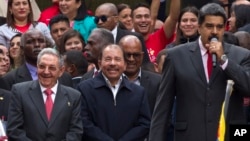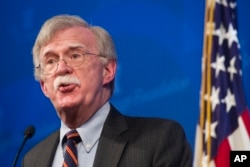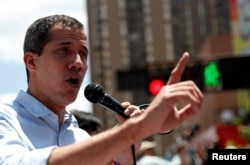The U.S. government on Wednesday will announce additional sanctions on Venezuela, as well as Cuba and Nicaragua, in the latest move against socialist governments in the Western Hemisphere.
The administration of U.S. President Donald Trump has prioritized dislodging Nicolas Maduro from Caracas, and recognizing National Assembly leader Jorge Guaido as president — an action also taken by more than 50 other countries.
Ahead of a speech Wednesday in Miami by National Security Adviser John Bolton, a senior administration official is emphasizing all options remain on the table concerning Venezuela, contending that the South American country is "increasingly close to a flex point."
"We want a peaceful transition of power, but we're determined there be a transfer of power," says the senior administration official. "Let Maduro and his cronies worry about what that means."
In response to a question from VOA News about increasing impatience for tougher action by Washington among those in the Venezuelan military who have quietly switched their loyalty to Guaido, the administration official contends "maximum pressure" applied by the Trump administration in the past three months "has come close to bringing the entire government to a halt."
The official adds, "it's a mistake to say things have stalemated."
As part of the effort to dislodge Maduro, U.S. officials also are tightening pressure on Cuba.
"The real pressure at the top of the government of Venezuela today is 20,000 to 25,000 Cubans," according to the high-ranking U.S. official. "But for the Cubans and Russians it might be over now."
In addition, the Trump administration will declare on Wednesday that it will allow, for the first time, lawsuits to be filed in the United States against all foreign companies in Cuba using properties confiscated from American citizens in the 1960s by the government led by Fidel Castro.
European countries have expressed concern about the lifting of waivers on Title III of the 1996 Holmes-Burton Act and threatened to challenge the move at the World Trade Organization.
"It will have some economic effect," predicts the senior administration official, who confirms European officials, some of whom asked the U.S. not to lift the waivers, have been notified in advance the move would be taken by Washington.
"They're entitled to sue. And we're prepared to watch them fail," says the official of anticipated legal action of lifting of the waivers that could also damage Cuba's efforts to attract additional foreign investment.
"Allowing these lawsuits marks another own goal in President Trump's Cuba policy," says James Williams, president of Engage Cuba, which lobbies for the normalization of U.S. ties with the communist island. "This doesn't punish the Cuban government; it lets them off the hook."
Williams tells VOA that American and European companies, which had permission to do business with Cuba, will be the ones hurt by the action, and Washington should negotiate for direct compensation from the Cuban government for property confiscation.
"The extraterritorial application of the U.S. embargo is illegal, contrary to international law and I also consider it immoral," EU ambassador to Cuba Alberto Navarro said in Havana.
The Trump administration also is poised to enforce Title IV of the same congressional legislation that gives the U.S. government "authority to deny visas or pull back visas of those trafficking in confiscated property" in Cuba, explains the senior administration official.
The official discussed the impending actions with a group of reporters Tuesday at the White House, intending to draw attention to Wednesday's address by Bolton, describing it as the second chapter of the national security adviser's "Troika of Tyranny" speech, following on remarks he made last November in Miami.
Wednesday's speech is to be made to alumni of Brigade 2056, a group of Cuban exiles sponsored by the Central Intelligence Agency, who failed in an attempted 1961 overthrow of the Castro government, known as the Bay of Pigs Invasion.
A six-decade old economic embargo of Cuba by the United States remains in effect.
During the Obama administration there were initiatives by Washington to calm the rough waters across the 150 kilometers separating Florida and Cuba, but the Trump administration has reverted to a Cold War-era approach toward Havana.
"It is ironic that President [Donald] Trump would make this fringe decision after the Trump Organization worked for years to open a Trump Hotel and golf course in Cuba," Williams tells VOA. "We have 60 years of history that shows we need to try something new. The Cuban and American people deserve better."









